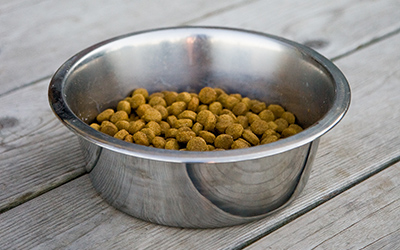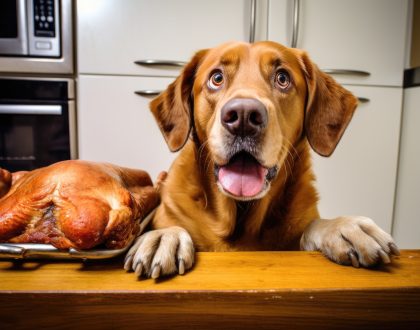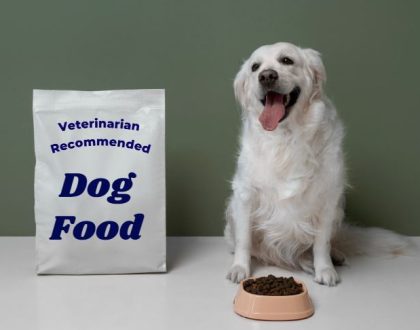
the scientific study of pet nutrition by veterinary nutrition specialists and experts.
Is it the food? Pet food-associated illness

Food-associated illness (“food poisoning”) is generally quite rare in pets compared to people. However, it does happen and it is important to know what to look for and what to do if you suspect that your pet’s food may have made them sick. Pet food-associated illness refers to when pets get sick because of a problem with a pet food. This is different from a food being healthy and good quality but just not agreeing with a certain pet. Pet and food mismatches are MUCH more common than true food-associated illness! True pet food-associated illness frequently leads to pet food recalls.
There are three broad categories of food-associated illness in pets: infections, toxins, and deficiencies.
- Infections are caused by eating live dangerous bacteria (ex. Salmonella), fungi, or other infectious agents in food, leading to infection of the pet. Infections from pet food occur most commonly from raw diets and uncooked treats (ex. pig ears, bully sticks, freeze-dried treats)
- Toxins can be naturally occurring such as bacterial (ex. botulism) or fungal toxins (ex. aflatoxin) that were missed by a manufacturer or can be a result of human error (ex. too much of a nutrient such as vitamin D is added to a food) or in very rare cases, intentional adulteration of the food. The recalls for melamine-contaminated pet foods in 2007 were due to adulteration – melamine was intentionally added to raw ingredients by one company as a form of food fraud.
- Deficiencies are uncommon in good quality commercial complete & balanced pet foods; when they occur, they are typically due to quality control problems at specific manufacturers. As pet foods are fed as the sole or main source of nutrition to dogs and cats, too little of an essential nutrient in a specific food can lead to disease (ex. thiamine or taurine deficiency in a cat fed a deficient diet).
Sometimes pet foods just don’t agree with a specific pet. They may be too high in fat, too low in fiber, or contain an ingredient that the pet doesn’t tolerate. This doesn’t mean that there is anything wrong with the food itself, it just may not be a good fit for the pet. However, there are several situations where you should have a higher level of suspicion for pet food-associated illness:
- Sudden illness of multiple pets in the household who eat the same diet or treats
- Sudden severe liver or kidney disease in previously healthy pets (this can be food-related but there are many infections and other non-food related issues that can also cause sudden liver and kidney issues!)
- A pet who seems to be healthy and usually is eager to eat suddenly has less interest in their normal food or treats
- A pet acts sick after eating from a newly opened bag or a can from a new case of cans of their usual diet and there are no other obvious causes like getting into the trash, etc.
- A diet or treat you are feeding has been recalled for bacterial contamination or deficient or excessive amounts of nutrients or is being investigated by the US Food and Drug Administration (FDA).
It can be a challenge to determine whether or not the food is associated with a specific pet’s illness, so if you are concerned that your pet’s food may have made them sick, it is important to STOP FEEDING THE FOOD and have your pet seen by your veterinarian as soon as possible. Your vet may test your pet’s blood or urine to look for the cause of their illness and to assess their overall health. Other specialized tests may also be required. If the results of the veterinary exam and tests are compatible with a food-associated illness, it will be very important to keep samples of the food so it can be tested. You can also look on the FDA’s website to see if there are other reports of problems with the food. (You can also subscribe to the FDA recalls email list!)
Ideally, you should keep the remainder of the food in the original bag for dry food , a few unopened cans from the same case or order (freeze any opened cans), and any remaining raw food (frozen or at room temperature as appropriate for the form of the food) in case it is needed for testing. As a general rule, keeping the original packaging (or at least a high resolution picture of it) until you finish all the food is important because it contains the UPC and date and lot codes needed to track the food if there is ever an issue.
Either you or a member of your veterinary team should also call the pet food manufacturer and you or your vet should file a report with the FDA. This allows the manufacturer and the FDA to determine if other pets are affected – multiple reports of similar issues suggest a problem with the food rather than just coincidence or other causes of the issues. You may be asked to provide some of the extra food to the FDA or to the manufacturer for testing. Try not to send them everything you have left – save some just in case you need to have it analyzed elsewhere.
Based on the issue, your veterinarian can advise you on the best treatment plan for your pet. Some food-associated illness is minor, but others can cause very serious or long-term health issues. By being aware of potential signs of a food-associated illness, you can ensure that if this rare situation does affect your pet, they will get appropriate care quickly. By reporting the issue to the proper authorities, you may also be able to prevent other pets from having similar issues.
Want to read more information on feeding your pet?
Subscribe to always know when we add new material!
Recommended Posts

Can Diet Help With My Dog’s Seizures?
January 18, 2024

The Most Popular Holiday Foods…That Your Pet Should Avoid!
December 08, 2023

Veterinarian Recommended Pet Foods: What You Need to Know
November 05, 2023

